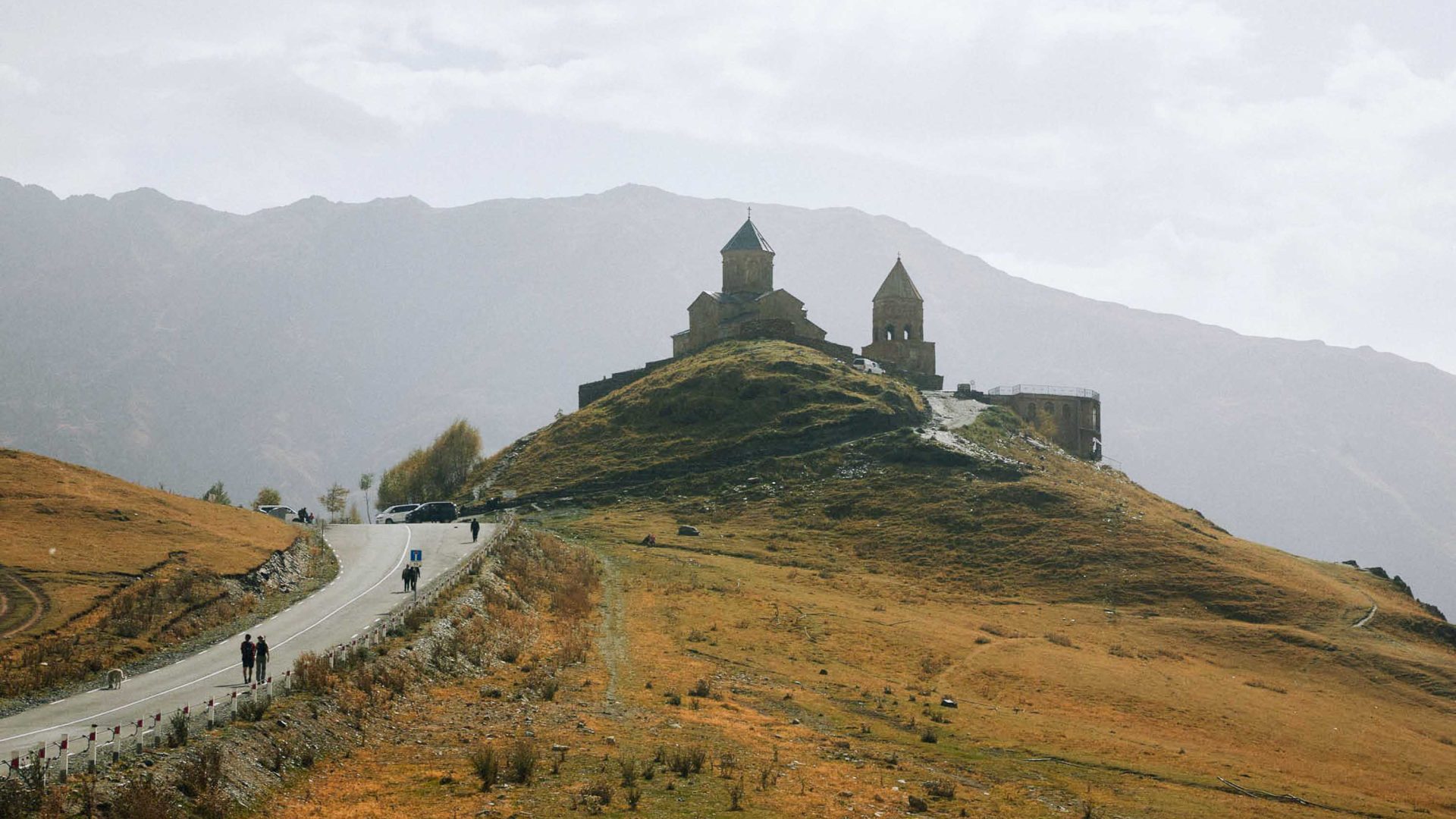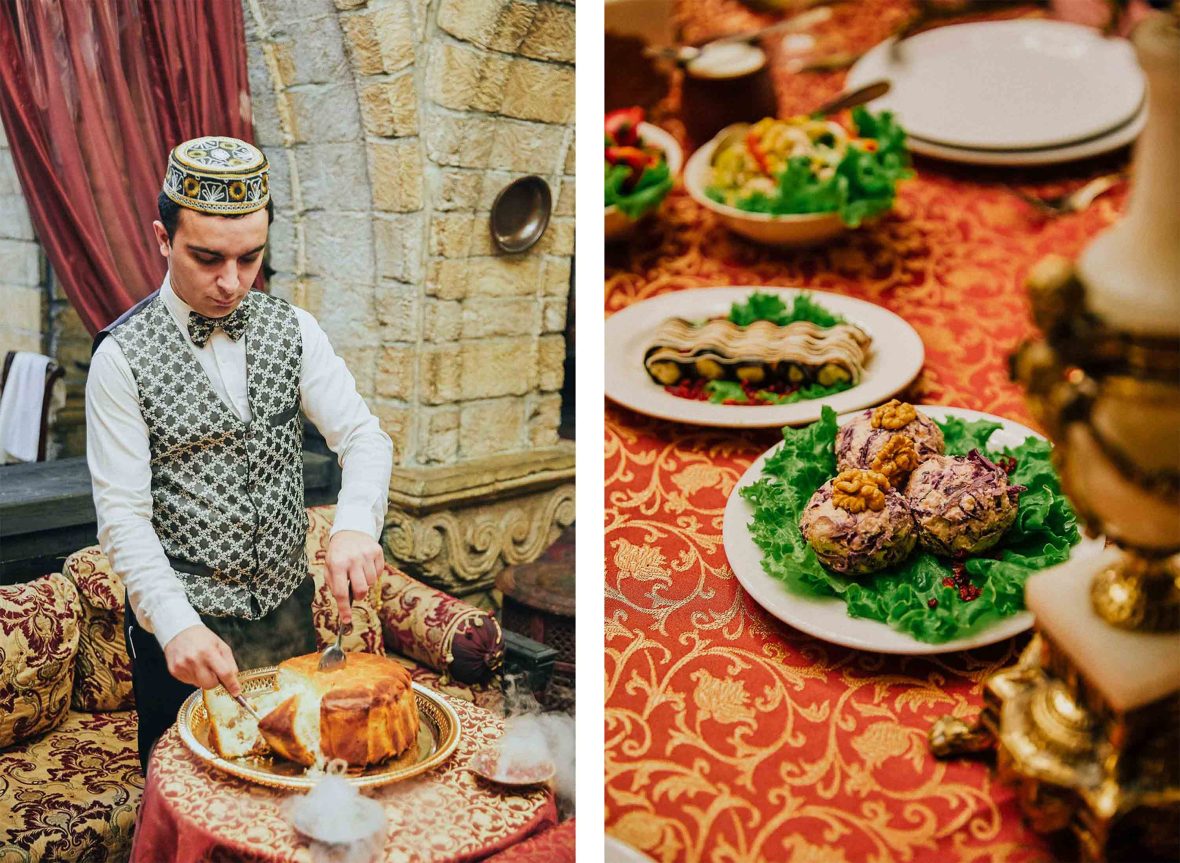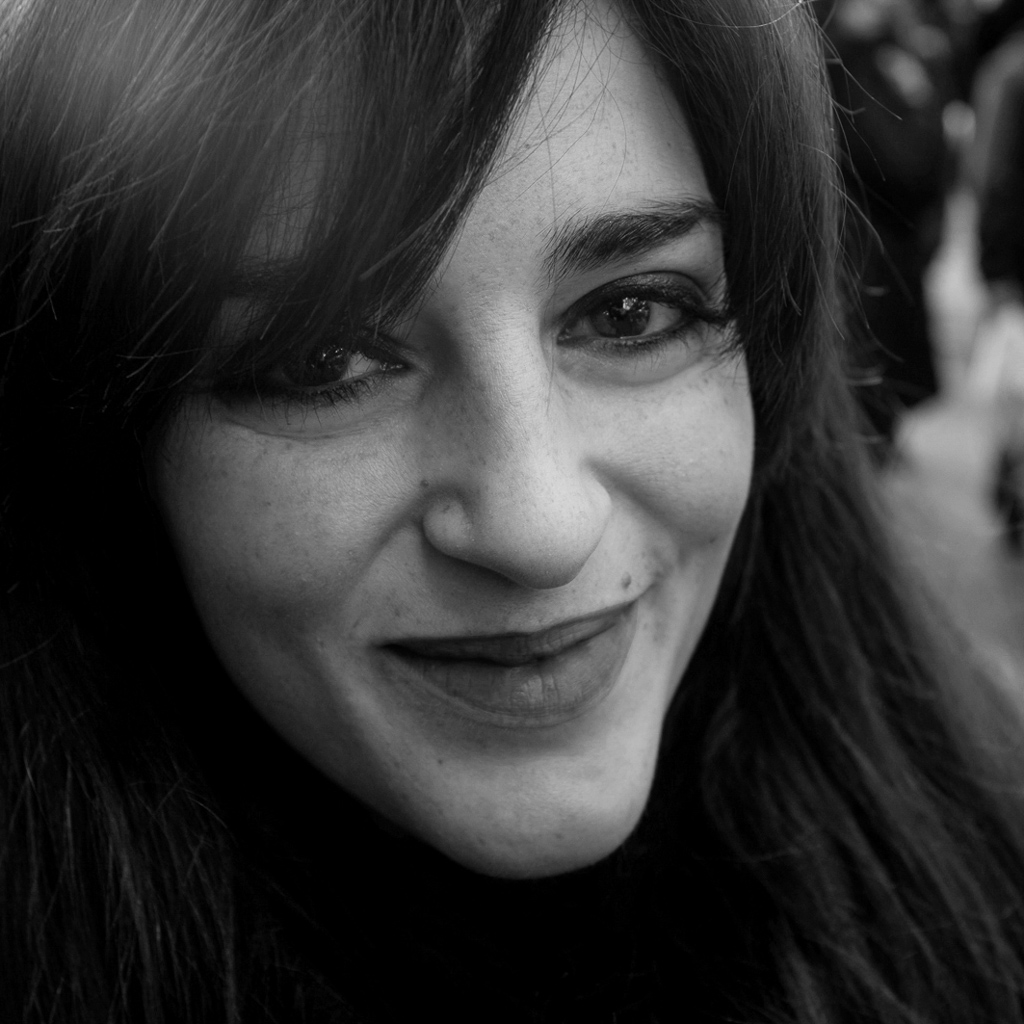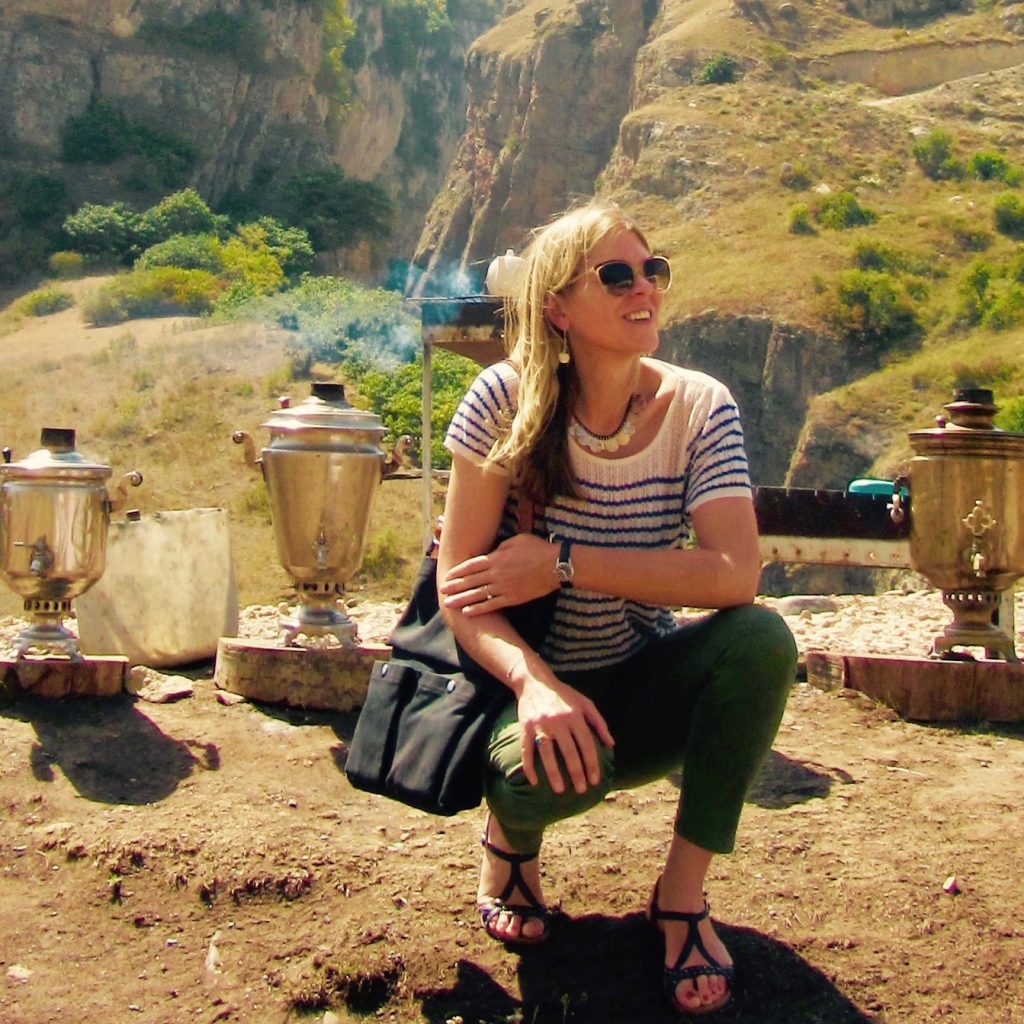
On a guided trip with Intrepid Travel, writer Alex King learns of the fraught history and modern culture of the world’s first wine-making country: Georgia.


On a guided trip with Intrepid Travel, writer Alex King learns of the fraught history and modern culture of the world’s first wine-making country: Georgia.
We cross the border into Georgia from Azerbaijan in a flurry of color and activity. The sun-baked, almost-desert landscape of central Azerbaijan is behind us and we’re making our way through the fertile foothills of the Caucasus in the Kakheti wine region in early fall.
Running parallel to the road to our north, is an imposing ridge of mountains, while to both sides, woodland is punctuated by vineyards and quaint farmhouses. Old Soviet trucks are belting along the main roads, their trays piled high with grapes, destined for Kakheti’s many celebrated wineries.
The Georgian nation has been forged through centuries of conflict: Many mighty empires have fought for control of this beautiful and strategic part of the world, from the ancient Greeks to the Mongols, Romans, Persians, Ottomans and the Soviet Union. The castles and fortresses scattered throughout this mountainous land, where Eastern Europe meets Western Asia, are a huge draw for tourists to this day and help bring this sometimes-bloody history to life.
Our Premium Azerbaijan, Georgia & Armenia trip with Intrepid Travel fills significant gaps in our historical knowledge and gives context to the events of today. Following Russia’s full-scale invasion on Ukraine, there are fears that ‘frozen conflicts’ in the Georgian breakaway provinces of Abkhazia and South Ossetia could become hot once again, frustrating efforts to mitigate the effects of climate change, which is already making life more challenging in the Caucasus.
Our first stop is the Begaso Family Winery, 500 meters above sea level and one of the region’s most internationally renowned new wineries. We’re greeted by sommelier, master winemaker and former wrestler Erekle Bezhitashvili, who will guide us through a winery tour, tasting and treat us to an indulgent supra, a feast of local Georgian produce—all the while generously sharing his philosophies on food, hospitality and life.
The natural techniques used by Begaso have remained unchanged for millennia: The grapes (they grow eight local varieties)—including stems and skins—are mashed and poured into qvevri (large clay pots), then buried underground, where the natural fermentation process (without yeast or chemicals) takes two to three weeks. The wine is then aged for months or years.
Georgia is the world’s oldest wine-producing country and an 8,000-year-old wine-stained qvevri was discovered during an archeological dig in a Neolithic-era village about 30 miles south of the capital Tbilisi in 2017. The qveri technique and the mythology that surrounds it feature on UNESCO’s intangible heritage list. While Erekle’s ancient ancestors would have approved of the way he makes his wine and recognized his 900-liter qvevris, there’s one new challenge that has forced him to make major adaptations: Climate change.
“The most important effect of climate change here is not global warming but increasingly strong UV waves,” Erekle explains. “This causes sunburn or sun necrosis [for the grapes], which is happening earlier each year. If you don’t pay attention, you can lose a minimum of 70 percent of your harvest.”
Climate change has brought forward hot spells and harvest time. Erekle’s family carefully chose the location of their vineyard for its potassium-rich soil in order to future-proof it against the effects of climate change.
“Without peace, no-one can appreciate the beauty of nature, the earth where we are living. I wish everyone peace.”
- Erekle Bezhitashvili
In Georgia, people believe that sharing food and wine is a way to discover someone’s soul. We sample Rkatsiteli Rosé and, my favorite, Saperavi, which has notes of pepper and tobacco. Each bottle is exquisitely paired—as per long-held Georgian custom—with local meat, vegetables, honey and cheese. Every Georgian meal is punctuated by cries of “gaumarjos!” (cheers) and loquacious toasts, with each guest taking it in turns to be the tamada or toastmaster.
“My first toast is for peace—for all countries, all nations,” Erekle exclaims, before he guides everyone in the ‘bell-ringing’ or clinking together of glasses. “Without peace, no-one can appreciate the beauty of nature, the earth where we are living. I wish everyone peace.”

The following day, we explore the sprawling Telavi Bazaar, where fresh meat and vegetables take the stage with colorful spices, local handicrafts and Georgian delicacies, such as tklapi—dried sheets of puréed fruit. Our Intrepid guide,Iuliia Shcherbakova, ushers us into a hidden corner of the market to meet Nana Kushitashvili, who monitors the safety of produce sold here.
Trained as a veterinarian, Nana has worked at the market for 20 years. We watch her slice off thin sheets of meat to put under an ancient microscope to check for pathogens. Nana explains that she is seeing the effects of climate change through her own eyes: She finds more cases of bad meat and food prices continue to rise because of flooding and local farmers having to buy more artificial feed for their animals.
Just outside Tbilisi lies the Tserovani Internally Displaced Peoples’ (IDP) camp. The biggest of its kind in Georgia, the camp houses 8,000 of the 26,000 ethnic Georgians who were forced to flee when Russia invaded South Ossetia in 2008. Now a small town in its own right, Tserovani IDP was built in just five months and completed in 2009, with identical dwellings spread out across a grid of interlocking streets. One of the buildings is home to Ikorta, a social enterprise employing internally displaced women who have no access to other means of employment. Ikorta is co-managed by 23-year-old Ana Akhlouri, who arrived here when she was nine years old.
Founded by the Mtskheta-Mtianeti Regional Hub NGO (MMRH), Ikorta won a grant for a kiln to blast the traditional silver and enamel jewelry made for sale by the eight women in the project—which everyone in our group tries their hands at making this afternoon. MMRH has also trained 160 women in business planning and funded the projects of a further 80.
The battle over historical memory is still very much alive in Gori. This history is still very close to the surface.
A hand-painted poster on the wall depicting IDP settlement reads: ‘No more war! No more displacement!’ After the workshop, Ana leads us through Tserovani, which has its own medical center, ambulance, mobile library, shops and a newly built church. An American in our group says it reminds him of the cookie-cutter houses in US suburbs. Some residents have planted vineyards or modified their houses, to make them feel more like home.
“I’ve visited our old house in Akhalgori and you feel it’s not your home anymore,” Ana explains. “The people are different and it’s now known as ‘Leningori’. I hope it will become part of Georgia again one day, but with politics changing so much these days, it’s hard to imagine that.”
We arrive in Gori in eastern Georgia, famous as the 1878 birthplace of Joseph Stalin, who ruled the Soviet Union from 1922 until his death in 1953. The Stalin Museum is still the most-visited museum in Georgia—something that 29-year-old Zhana Odiashvili, founder of Gori Free Walking Tour, would like to change. In fact, Zhana has made it her mission to promote the true Gori and its many treasures to visitors, while challenging people in her hometown to think more critically about their history.
“I consider Stalin a dictator and a tyrant,” Zhana explains. “Other people here think he’s a hero who rose from poverty to become a great leader. I have a real problem with The Stalin Museum because it contributes to this historical amnesia, glorifying Stalin’s legacy while barely mentioning his many crimes and killing millions of people.”
From the Stalin Museum, we walk along Stalin Avenue, which Zhana unsuccessfully petitioned to have renamed ‘Freedom Avenue.’ Opposite an imposing Soviet-era World War II memorial, Zhana points out where Stalin’s statue once stood on the town’s main square before its removal was ordered by the national government in 2010. Some older residents still publicly call for its return, exposing the divide between younger pro-European Georgians and generations who still harbor nostalgia for the Soviet era. The battle over historical memory is still very much alive in Gori. This history is still very close to the surface.
The next generation will be the stewards of this ancient country’s future challenges. Georgia, like many other nations, needs to find ways to develop sustainably and adapt to climate change for its key agricultural and tourism sectors. Yet, the bubbling threat of conflict and instability makes regional solutions all the more important.
“When you don’t hold past dictators accountable for their crimes, new ones are born,” Zhana reflects. “I’m sure this craziness will end soon. Now these dictators are playing dirty games but I’m sure they will not win. We might have stupid politicians, but Georgian young people are wise, brave and want a future as part of Europe.”
***
Adventure.com strives to be a low-emissions publication, and we are working to reduce our carbon emissions where possible. Emissions generated by the movements of our staff and contributors are carbon offset through our parent company, Intrepid. You can visit our sustainability page and read our Contributor Impact Guidelines for more information. While we take our commitment to people and planet seriously, we acknowledge that we still have plenty of work to do, and we welcome all feedback and suggestions from our readers. You can contact us anytime at hello@adventure.com. Please allow up to one week for a response.








Can't find what you're looking for? Try using these tags: